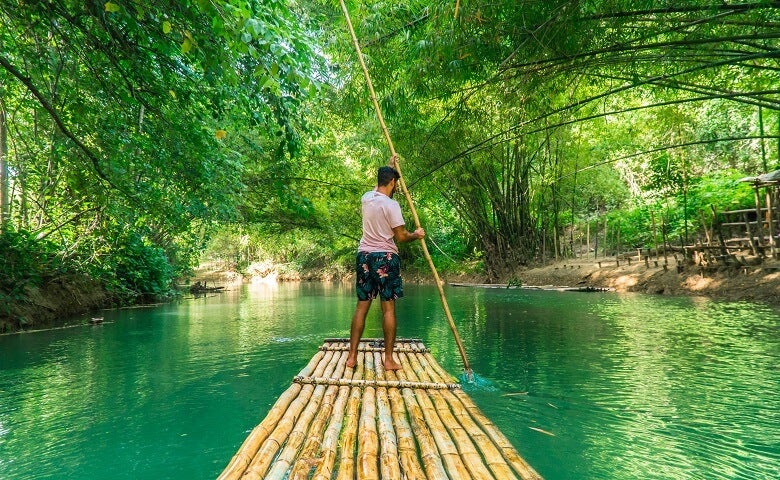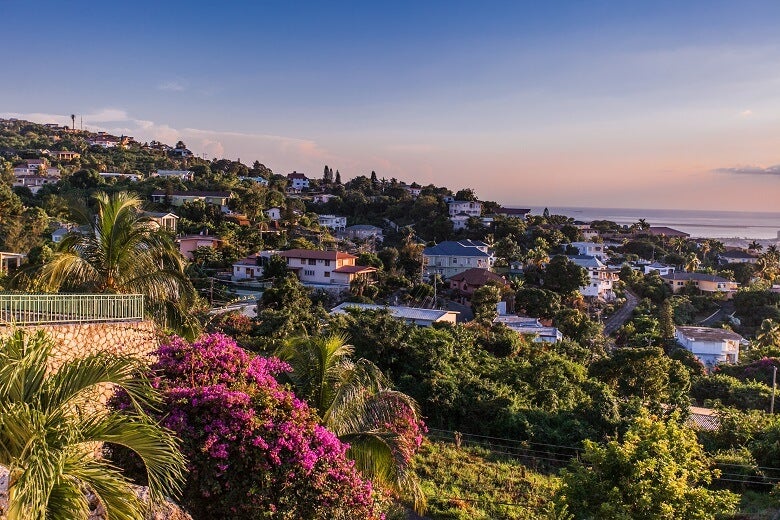Healthcare in Jamaica
Jamaica is a paradise for expats looking for a new adventure. White sandy beaches, vibrant culture, tropical climate, and friendly locals – what more could you ask for?
When it comes to the Jamaican healthcare system, however, expats might be disappointed. So, before you jump headfirst into island life, spend some time sussing out which healthcare options are available to you. We’ve outlined everything you need to know below.
If you’ve already decided that you would like to be covered by health insurance before you head to Jamaica, check out our list of recommended healthcare providers. From there, you can request free quotes from whichever company suits your needs.

One to tick off the bucket list: floating down the green haze of The Martha Brae River in Montego
Jamaican healthcare: key statistics
- 0% of people with health insurance
- 0Average life expectancy
- 0Number of patients per doctor
What’s on this page?
01 | How does Jamaica’s healthcare system work?
02 | Is healthcare free in Jamaica?
03 | Quality of healthcare in Jamaica
04 | Healthcare in Jamaica for foreigners
05 | Do I need health insurance in Jamaica?
06 | Benefits of private medical cover in Jamaica
07 | How much does health insurance cost in Jamaica?
How does Jamaica’s healthcare system work?
The Jamaican healthcare sector is split into public and private providers. The public sector is the primary provider of public health, while the private sector dominates ambulatory services (medical care provided on an outpatient basis) and pharmaceuticals.
Treatments work on a co-payment system – the National Health Fund (NHF) pays most of the cost, and the patient covers the rest.
What can you expect to be covered on the state insurance?
- Primary treatment (essential healthcare)
- Hospital treatment
- Treatment for the following 17 chronic diseases:
- Asthma & Subsidy for Spacers & Masks
- Arthritis
- Breast cancer & Breast Cancer Receptor Studies Test
- Benign prostatic hyperplasia
- Diabetes & Diabetes Programme
- Epilepsy
- Glaucoma
- High Cholesterol
- Hypertension
- Ischaemic heart disease
- Lupus
- Major depression
- Prostate cancer
- Psychosis
- Rheumatic fever/heart disease
- Sickle cell disease
- Vascular disease
The NHF is funded by taxation on all tobacco products, payroll tax, and a special consumption tax (mainly from alcohol, petroleum, and motor vehicles).
Is healthcare free in Jamaica?
Jamaica’s government is aiming to provide universal healthcare coverage – which means the care is free for the poorest members of society.
In the 2000s, Jamaica introduced two main policies – the abolition of user fees at public facilities and the establishment of the Jamaica National Health Fund (NHF) – in an effort to introduce universal healthcare.
Although this has provided access to free healthcare at some facilities, the extremely poor standard of the public sector drives many Jamaicans (from all income groups) to seek care from private facilities. This is mirrored in feedback from some healthcare staff. Before the removal of user fees, 76% of health practitioners rated the quality of care as good – after the removal, only 47% of practitioners rated it as ‘fair’.
For those that stick with the public healthcare system, there are a few ways to receive subsidised care:
- The NHF Card helps pay for a select list of prescription drugs, respiratory devices, diabetic supplies, and diagnostic tests
- The NHF Card can also be combined with a private health insurance provider’s card to cover prescription costs
- The Jamaica Drug for the Elderly Programme (JADEP) subsidises drugs for older residents
- The GOJ Card entitles Jamaican residents to a list of drugs in public-sector facilities with no out-of-pocket cost
Quality of healthcare in Jamaica
The Lancet’s universal healthcare coverage index rates Jamaica 57 out of a total of 100 points, which isn’t a good score. To compare, the UK scored 88 and the US scored 82.
Over the years, Jamaica’s standard of healthcare has declined rapidly. There are regular shortages of medical equipment, a lack of government funding, and majorly understaffed facilities – with only one doctor per 2,000 people.
Another key issue with Jamaica’s healthcare system is its accessibility. On the island, Kingston and Montego Bay are the only cities where people can receive comprehensive medical care. In some cases of prolonged sickness, patients might even have to leave the country to access the appropriate facilities – making international health insurance essential.
The good news is that Jamaica is currently in the process of overhauling its national health insurance scheme, and it is aiming to provide the Jamaican population with universal coverage. The government is also planning on ramping up its healthcare expenditure to 5.4% of its GDP in the coming years, meaning more funding is on the way.
Healthcare in Jamaica for foreigners
As long as you are either making contributions into the NHF or are prepared to pay fees upfront, expats are entitled to access public healthcare in Jamaica.
However, since advanced public facilities are only in Kingston and Montego Bay, many visitors choose to invest in private health insurance. If you think that this would be a suitable option for you and your family before your move to Jamaica, check out our list of recommended healthcare providers. From there, you can request free quotes from whichever company suits your needs.
Do I need health insurance in Jamaica?
It’s not compulsory to have health insurance in Jamaica, but it’s certainly recommended. Overall, only 20% of people in Jamaica have health insurance – 11% of that are government workers, and 9% of that are private-sector workers.
The public healthcare system’s lack of funding, long waiting times, and poor quality of care mean that many people end up opting for private health insurance anyway. Plus, if you’re in need of specialist treatment that is unavailable on the island, you might even need to fly to Florida or somewhere else nearby.
So, if you can afford it, an international private plan would give you and your family the most protection whilst living in Jamaica.

A view of Kingston – one of Jamaica’s two cities with healthcare infrastructure – at sunset
Benefits of private medical cover in Jamaica
Private healthcare can offer a few extra things that Jamaica’s state healthcare can’t, including:
- On-demand access to a network of private hospitals (in addition to public ones)
- Shorter waiting times
- Access to better facilities
- Fewer language barriers
- Cover for ongoing expenses, such as GP appointments and prescriptions
How much does health insurance cost in Jamaica?
In 2020, the Jamaican government introduced the ‘Jamaica Cares Programme’, meaning travellers need to pay a £40 fee to cover any illnesses, including COVID-19, and natural disasters while visiting Jamaica.
If you’re staying for longer than a short visit, or want to avoid the public sector, a private plan could save you a lot on out-of-pocket fees. But, unfortunately, the price of private insurance isn’t exactly black and white. The final figure will depend on a number of different factors.
Key variables that alter the price of insurance include:
- Age (the higher, the more expensive)
- Area of cover (i.e. are other areas required in the coverage, in addition to Jamaica? If those other areas include any of the US, the Caribbean, Singapore, China, Hong Kong, or Dubai this can significantly increase the overall price)
- Any pre-existing conditions
- Choice of provider
Thankfully, you can simplify this process by checking out our list of recommended healthcare providers. From there, you can request free quotes from whichever company suits your needs.
Advice for people moving to Jamaica
Now you’re up-to-date on Jamaica’s healthcare system, you can figure out whether public or private healthcare will work best for you.
Once you’ve made this choice, you can look forward to sunny skies and beautiful beaches. To find out more, check out our page on moving to Jamaica.

